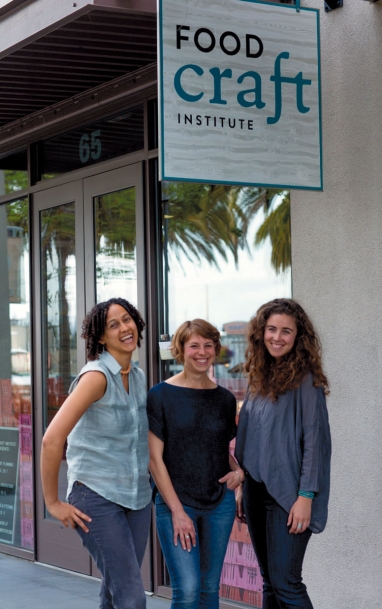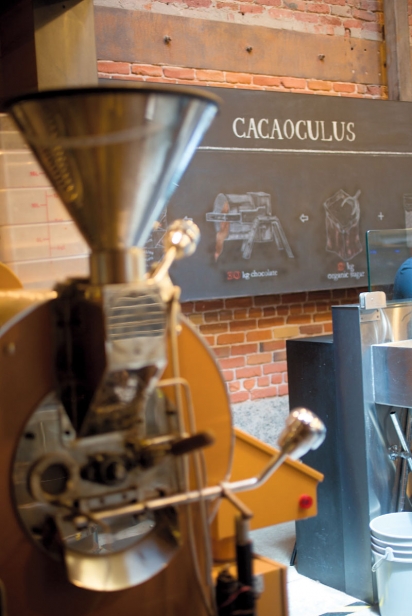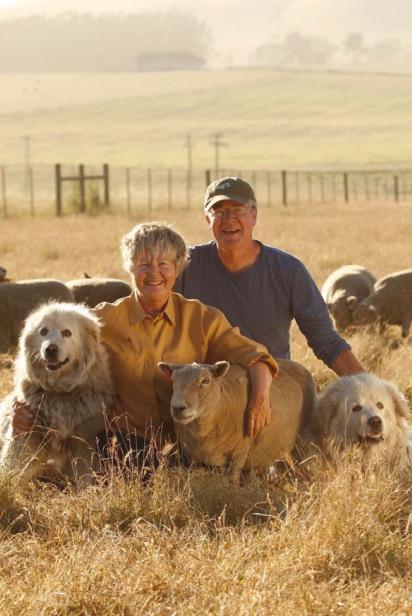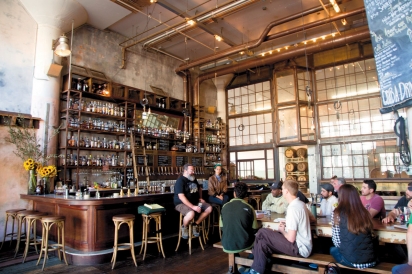The Food Craft Institute
Reshaping the U.S. Food Landscape, One Craft Food Business at a Time
Ally DeArman doesn’t care about trendy artisan food businesses—”trendy” being the keyword. DeArman actually cares a great deal about artisan food businesses. She just wants them to last.
DeArman is the director of the Food Craft Institute (FCI), a nonprofit educational institution that seeks to reshape the U.S. food landscape by creating a permanent sector of viable artisan food businesses. To do that, FCI teaches food craft methods and techniques alongside real-world business planning to aspiring food entrepreneurs.
“A big part of our mission is making it so that artisan food businesses aren’t a trend,” said DeArman during an interview in the institute’s Jack London Square headquarters in Oakland. “For that to be a reality, we need to curb the number of food businesses that pop up and fail.”
The FCI was founded by Anya Fernald in 2011, a few years into organizing the Eat Real Festival, a multi-day food event in Oakland featuring Bay Area food vendors, demos and workshops. While working with food companies during the festival, organizers saw a distressing number of entrepreneurs with good products and poorly run businesses. Businesses fluctuated, and the quality of the product determined little about the success of the business.
Around the same time, entrepreneurs were clamoring for more affordable commercial kitchen space in the Bay Area. While a number of new and well-established spaces could provide kitchen access, FCI saw a real need to make the businesses going into those kitchens economically sustainable.
It’s a Saturday morning and a handful of students are sipping coffee and munching on banana bread inside the back of Modern Coffee, a sleek red and white accented café in Uptown Oakland. Owner Kristen Nelson opens class with her personal story: a long journey beginning at Peet’s Coffee & Tea and moving on to owning one of the first multiroaster cafés in the Bay Area. She’s now on her second café and has her own line of coffee beans. It’s veterans like Nelson who create a high draw to the “master courses” offered by FCI. Each course is content based, focusing on one specific food industry, and taught by established business owners and master artisans. The very first course was a jams, sauces and condiments course, reeling in instructors from Blue Chair Fruit, INNA Jam and June Taylor Jams. Now there are master programs for coffee, butchery, chocolate, pickles and craft beer.
“After Eat Real we had connections with all these companies that were growing, and a lot of the Bay Area businesses that started in 2009 were gaining recognition on a national scale,” said DeArman.
FCI was perfectly situated to build an instructor network of artisan food pioneers, people like the founders of Blue Bottle Coffee and Ritual Roasters, Drake’s Brewing Company and Magnolia Brewing Company, Dandelion Chocolate and TCHO, and the list goes on.
The coffee roaster and retailer master course, for instance, intersperses financial and business planning with practitioner modules at some of the leading roasters in the Bay Area: Equator Coffees and Teas, Blue Bottle Coffee, Berkeley Co-Roasting, Modern Coffee, Royal Coffee, Red Bay Coffee and Sweet Maria’s.
“In Puerto Rico, we don’t have a sense of community like this in the industry. We’re $70 billion in debt, so people are competing and aren’t sharing information,” said Alex Medina Rivera, who took a pause from his barista catering and consulting company in Isabela, Puerto Rico, to take FCI’s coffee master course. “I came here because I wanted to get to know the rest of the coffee world, and it’s exactly what I needed.”
His cohort was made up of two Bay Area coffee aficionados with families in coffee farming abroad, a former San Francisco café owner figuring out what’s next and an ex-cop home roaster interested in roasting on a larger scale.
Through each practitioner visit, students get an in-depth education on coffee sourcing, roasting, farmer partnerships, ordering, equipment and branding and public relations. DeArman emphasized that information around alternatives to brick-and-mortars, like carts and pop-ups, was vital, too.
At Modern Coffee, Nelson is starting off her lesson with a dose of reality. “How many small retail businesses survive?” she asks the group to guess. According to the U.S. Small Business Administration, it’s 75% in the first year, 66% in year two, and only 50% in year five.
Except for maybe a truffle in the chocolate master course, things aren’t sugarcoated at FCI. The topic of failure comes up often. About a third of FCI’s graduates have gone on to launch a business or are continuing the business they were in, and DeArman doesn’t necessarily think that’s a pessimistic statistic.
“That means that 70 or so percent of people who came in decided not to open a business, but maybe did something more productive with their time,” she said. “It doesn’t mean those students are less passionate about the food or the product, it just means they are better educated about what it takes to start a successful business.”
Through those lenses, $1,200 for a six-week master course (60% of FCI students receive financial aid) is a relatively cheap lesson learned for would-be entrepreneurs.
Deborah Walton, owner of Canvas Ranch in Petaluma, attended the master course on jams, sauces and condiments in 2013. Walton describes herself as a seasoned farmer and marketing executive, and says she took the class with the goal of developing value-added products to sell at farmers’ market stands and perhaps break into retail.
“I gained the courage to walk away from my idea,” she said. “My sauce idea was and is a great one, but on a small scale—and I didn’t want to embark on a major enterprise—I wasn’t going to be able to make enough money.”
Kendra Kolling, owner of Nana Mae’s Organics in Sebastopol also took a jams master course (the inaugural class, in fact) and graduated with a similar takeaway. She never launched the small-batch craft line she was thinking of developing, but applied her newly acquired business acumen to her pop-up and catering business, The Farmer’s Wife.
“I used a lot of what I learned to make a really well-thought out business plan, and scale and grow without burning out,” she said. She’s now selling her award-winning locally sourced artisan grilled cheese sandwiches and salads at the San Francisco Ferry Building farmers’ market and was invited to participate at the Outside Lands and Bottle Rock festivals this year.
With a few years of the master courses under its belt, FCI answered the demand for additional business planning help outside of specific industries and added a new layer of educational options. Offered as stand-alones or as an entire year of coursework, FCI’s business modules cover business basics, from legal business structures and sales forecasting to marketing and data analysis.
For Rick Perko, co-owner of Flour Craft Bakery in San Anselmo, dropping in for a week-long business course was a good opportunity to build on an already rapidly growing business. The gluten-free bakery had been open for a year, and their granola was selling at Whole Foods Markets and other retailers. Without much formal food business training, Perko and his wife wanted guidance with opening a second location.
“The workshop helped me to break down the complexities of what this would entail into more manageable pieces,” he said. “Two years later and we have expanded all phases of our business and continue to grow.”
Since FCI’s first course offering in 2012, the landscape for small food businesses in the Bay Area has certainly shifted. On one hand, increased rent prices for commercial and residential spaces in San Francisco and Oakland are squeezing businesses out into other areas. On the other hand, crowd funding and micro-loan options have grown, and DeArman thinks that accessing start-up capital is less of an obstacle than it used to be.
“Five years ago access to capital was the number one issue,” she said. “But besides some issues around minimum wage and labor, the environment isn’t dire right now if folks are flexible in terms of where they want to operate.”
Over 200 students have matriculated to the FCI since it began, and alumni are setting down roots across the Bay Area—and beyond. Harmonic Brewing opened last year in the Dogpatch, and Temescal Brewing was nearly there at the time of print. Both Slojoy Coffee and Sow Juice opened permanent locations last year. Meanwhile, alumni like Noble Brewing, a marketplace connecting home brewers to beer lovers, and Bloom, a coffee subscription service for third wave roasters, are creating even more channels for craft food businesses. Out-of-state companies like Left Bank Butchery in Saxapahaw, North Carolina, and Beltex Meats in Salt Lake City launched soon after taking the butchery master course.
Together, FCI believes these types of businesses will change America’s food landscape, creating a permanent community of craft food business, and in turn, better food, better health and better environmental practices for the country overall. DeArman says the institute tries to stay away from beating students over the head with the word artisan, instead bringing in instructors who demonstrate how socially and environmentally responsible practices are also good for business.
“All the people we work with are really dedicated to their product and quality, and that goes hand-in-hand with sourcing ethically and equitably and creating a business that treats workers well,” she said. “They’re making something that’s representative of a healthier food system, and encouraging others to take part.”








